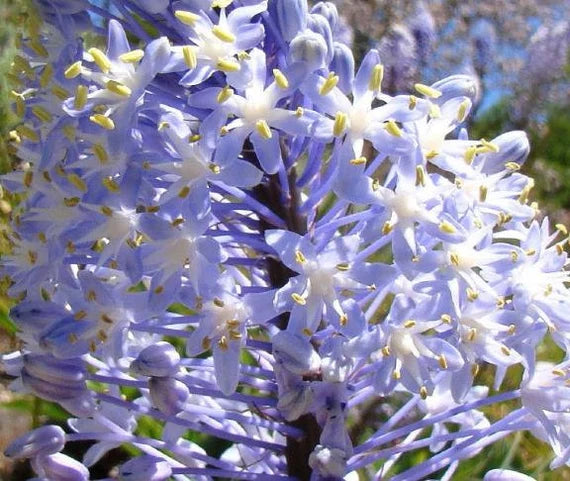
Dharaseeds
Absinthe Wormwood Seeds
Estimated delivery between February 04 and February 07.
Absinthe Wormwood, scientifically known as Artemisia absinthian, is a perennial herb famously used in the production of absinthe, an aromatic, bitter liqueur. This hardy, aromatic plant is prized for its distinctive silvery-green foliage and its potent, somewhat bitter flavor. While its primary association is with the creation of absinthe, it also offers medicinal benefits and serves as an attractive addition to herb gardens, particularly in areas where a natural insect repellent is desired.
Key Benefits
- Distinctive Silvery-Green Foliage: Known for its elegant, feathery, silvery-gray leaves, Absinthe Wormwood adds a striking contrast to other plants in the garden.
- Drought-Tolerant: Once established, this plant is drought-resistant, making it an excellent choice for xeriscaping or low-maintenance gardens.
- Natural Pest Repellent: The strong aroma of the plant helps to repel pests, including moths, aphids, and mosquitoes, making it beneficial in gardens and near outdoor living spaces.
- Medicinal Uses: Historically used to treat digestive issues, as well as its potential antimicrobial and anti-inflammatory properties.
- Culinary Applications: Used in small quantities to flavor dishes and liqueurs, particularly absinthe.
Variety Features
- Plant Characteristics: Absinthe Wormwood is a perennial herb that grows in bushy clumps, with fine, silvery-gray leaves that have a distinct bitter aroma. It produces small, yellow-green flowers, though the plant’s primary value is in its foliage.
- Height: Grows up to 3–4 feet tall with a similar spread, making it a substantial herb in garden settings.
- Growth Habit: The plant forms a bushy, mounded shape with soft, aromatic foliage.
- Flower Color: Small, yellow-green flowers that are not typically the main ornamental feature.
- Aromatic Scent: The leaves exude a strong, bitter aroma that is both distinctive and medicinal.
Planting Instructions
Planting Season
- Best Time to Plant: Spring or fall, after the last frost date, as the plant prefers cooler climates to germinate.
- Temperature: Thrives in temperatures between 60°F–75°F (15°C–24°C).
Planting Details
- Planting Depth: Plant seeds 1/8 inch deep. If transplanting, dig a hole that accommodates the root ball, spacing plants 18–24 inches apart.
- Soil Requirements: Prefers well-drained, slightly alkaline soil with a pH of 6.5–7.5. It tolerates poor soil conditions but will thrive in moderately fertile soil with good drainage.
- Sunlight: Full sun to part shade. It performs best with at least 6 hours of direct sunlight per day.
- Watering: Water moderately during the growing season, allowing the soil to dry between waterings to avoid root rot.
Care Instructions
- Watering: Once established, Absinthe Wormwood is drought-tolerant and requires minimal watering. Overwatering can lead to root rot, so it’s essential to ensure good drainage.
- Fertilization: Fertilize lightly in early spring with a balanced, slow-release fertilizer. Avoid overfeeding, as excessive nutrients can lead to leggy growth.
- Pruning: Trim back the plant in early spring to remove any dead or damaged stems and encourage a fresh burst of growth.
- Pest and Disease Control: Absinthe Wormwood is generally pest-resistant, but it may attract aphids in dry conditions. Use organic insecticidal soap or neem oil if needed.
- Winter Care: Hardy in USDA zones 4-9, this plant should be mulched in colder climates to protect the roots from freezing.
Harvesting
- Maturity: The plant reaches full size by late summer, with its silvery-gray foliage being the primary feature.
- Leaves: Harvest the leaves throughout the growing season, ideally before the plant flowers, to capture the strongest flavor and aroma.
- Flowers: The small yellow-green flowers are not typically used in culinary applications but can be removed to improve the appearance and encourage further leaf growth.
- Method: Use sharp scissors or pruning shears to cut stems or leaves. The leaves can be used fresh or dried for storage.
Storage
- Fresh Storage: Fresh leaves can be stored in the refrigerator for up to a week when wrapped in a damp paper towel.
- Dried Storage: Dry leaves in a warm, dry area and store them in an airtight container in a cool, dark place. Dried leaves maintain their potency for up to a year when stored correctly.
Culinary and Medicinal Uses
- Culinary Uses: Absinthe Wormwood is used sparingly in cooking, often for its bitter flavor, particularly in liqueurs like absinthe. It can also be used to flavor meats, sauces, and desserts in very small quantities.
- Medicinal Uses: Historically, Wormwood has been used for digestive support, particularly in treating indigestion, bloating, and appetite loss. It also has antifungal and antimicrobial properties, which may help in treating infections or acting as a mild laxative.
- Aromatherapy: The strong aroma is used in certain traditional herbal remedies, particularly for calming and digestive purposes.
- Pest Repellent: The strong odor of Absinthe Wormwood is a natural insect repellent and is often planted around the garden or near outdoor seating areas to ward off pests.
Conclusion
Absinthe Wormwood (Artemisia absinthium) is a versatile, hardy herb that offers both ornamental and functional benefits. Its silvery-green foliage and aromatic leaves make it a unique addition to any garden, while its medicinal and culinary uses add to its value. With minimal care requirements and its ability to repel pests, Absinthe Wormwood is an excellent choice for gardeners looking to enhance their landscapes with an attractive, practical, and historic plant. Whether used for its aesthetic appeal, medicinal properties, or in culinary applications, this perennial herb is sure to thrive in your garden for years to come.







